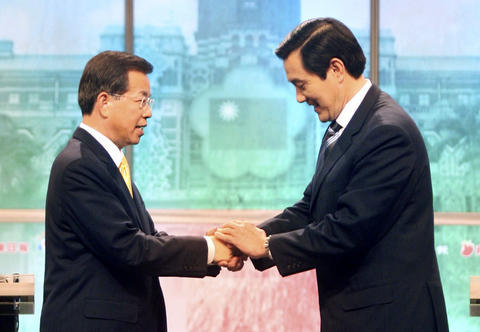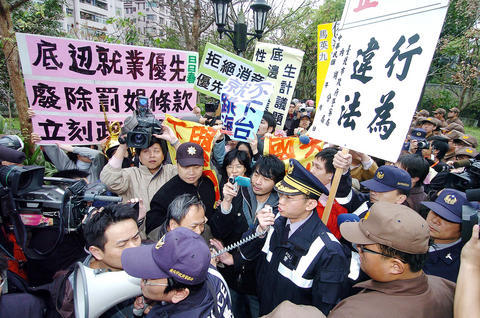Democratic Progressive Party (DPP) and Chinese Nationalist Party (KMT) presidential candidates Frank Hsieh (謝長廷) and Ma Ying-jeou (馬英九) went head to head in their first pre-election televised debate yesterday. They discussed issues ranging from national identity and cross-strait affairs to the economy, environment and social welfare.
Both saw eye to eye in seeking direct transportation links with China, with Hsieh and Ma pledging to negotiate and implement weekend direct charter flight services within three months of being elected president. Ma added that he would push for daily flights within six months.
On national identity, Ma, a Mainlander born in Hong Kong, stressed his Taiwanese identity promising to prioritize the nation's future and people's needs if elected.

PHOTO: REUTERS
"I am Taiwanese. I am a Taiwanese who grew up in Wanhua. I am a Taiwanese who grew up eating Taiwanese rice and drinking Taiwanese water," he said.
"I want to act as an upright Taiwanese, and I will be buried in this land. I gave up my job in the US and I gave up my [US] green card. Nothing will change my love for Taiwan," Ma said.
Hsieh said he has never hesitated to call himself Taiwanese and that he has educated his children to think likewise.

PHOTO: CHEN TSE-MING, TAIPEI TIMES
Hsieh criticized Ma for being inconsistent in defining his identity as a decade ago he had called himself a "new Taiwanese," changing it to "Taiwanese and Chinese" five years ago and then yesterday calling himself a "genuine Taiwanese."
Pressing on allegations that Ma holds permanent US residency -- an issue the Hsieh camp has hinted indicates a lack of confidence in Taiwan's future -- Hsieh yesterday questioned whether Ma was willing to promise that he and his wife had never possessed US or Hong Kong citizenship.
Hsieh also asked whether Ma would apologize to the public if evidence proved that he possessed US permanent residency before Jan. 27 this year.
"National identity is not a lip service issue," he said. "When Vice President Annette Lu (
Ma responded that he had explained twice last month that he and his wife Chow Mei-ching (
"My wife and I did not obtain permanent residency or nationality from the US or other countries," he said. "We did once have green cards, but we gave up residency 20 years ago."
The two also crossed swords on the issue of integrity, accusing each other of corruption.
Hsieh became emotional when Ma questioned the integrity of Hsieh's aides involved in various corruption charges, while querying Hsieh's role.
Ma, while pledging to put his and his wife's stocks into a trust and vowing to prevent his family members from serving as government officials if elected, condemned Hsieh over Kaohsiung City Government officials' alleged involvement in corruption cases under his administration.
"Shouldn't you be responsible for government officials' corruption cases as a former premier and Kaohsiung mayor? Should people tolerate such a government for four more years?" Ma said.
In response, Hsieh, noting Ma's graft charges over his mayoral allowance case during his stint as Taipei mayor, criticized Ma for double standards.
Hsieh also dismissed Ma's claim that none of his aides were indicted for corruption and berated Ma for requesting that the prosecutor handling his corruption case be removed.
In response, Ma insisted that he was found not guilty in two trials, urging Hsieh to take responsibility for the corruption cases in Kaohsiung.
On foreign affairs, Hsieh said one way to resolve problems was to develop closer relations with non-governmental organizations.
Using money for diplomatic purposes was not "dollar diplomacy," Hsieh said, because the US once provided Taiwan with financial assistance. Taiwan in turn must help others now it is better off, he said.
Vowing to maintain peace across Taiwan Strait and not to address the issue of unification with China if elected, Ma said he would demand that China stop marginalizing Taiwan on the international stage and call for a ceasefire with Beijing on the diplomatic battlefield.
In response to Ma's proposal of a "diplomatic truce" with China, Hsieh said nobody would oppose the idea, but the question was what price the country would have to pay.
"Foreign affairs must transcend party lines. Political parties must cooperate and the people must unite or it will give Beijing an opportunity to take advantage of us," he said.
"We will not have many bargaining chips on the negotiation table if political parties see their rival's failure as their achievement," he said.
In order to have a better visual effect for the audience, organizers prepared a platform for Hsieh to stand on so he could appear to be the same height as Ma. Hsieh is 165cm tall and Ma is 178cm.
The first segment of the debate yesterday had Hsieh and Ma respond to 20 videotaped questions selected by the organizers from among 456 questions contributed to PeoPo, a Web site specially set up for the general public to express their concerns on the Internet over the candidates, their policies and the future of Taiwan.
The 20 people chosen were then given the opportunity to question both candidates directly at the debate, based on the candidates' answers to the videotaped questions, which included issues such as Taiwan's national identity, Taiwan's participation in the Kyoto Protocol, same-sex marriage, the promotion of aboriginal culture, social welfare and economic development.
Hsieh and Ma then challenged each other with three questions in the second section of the debate, with responses to be made within a time limit of one minute.
At the end of the debate, Hsieh and Ma were each given three minutes to make concluding remarks.
In his concluding remarks and at a post-debate press conference, Hsieh questioned Ma's ability, saying the KMT candidate makes many promises but hardly ever delivers.
"His promises are like a restaurant menu. The question is whether he can cook those dishes and whether they are edible," he said. "He tends to say one thing in the morning but change it in the evening. How can he expect the people to trust him?"
He also questioned Ma's honesty.
Hsieh said Ma had not answered his question about the green card issue but had only reiterated that his green card was already invalid.
Outside the Public Television Service building in Neihu, where the debate took place, several interest groups staged protests before the start of the debate.
Members of the Collective of Sex Workers and Supporters made a plea for the decriminalization of prostitution. They also asked the two candidates to present detailed policy regarding how to assist the disadvantaged.
A coalition of labor groups requested the two candidates make good on their promises or step down or "jump into the sea."
Yesterday's debate was the first of two televised debates organized by the Central News Agency, the Liberty Times (the Taipei Times' sister newspaper), the China Times, the United Daily News, the Apple Daily and the Public Television Service.
The second debate has been scheduled for March 9.
ADDITIONAL REPORTING BY CNA

NATIONAL SECURITY THREAT: An official said that Guan Guan’s comments had gone beyond the threshold of free speech, as she advocated for the destruction of the ROC China-born media influencer Guan Guan’s (關關) residency permit has been revoked for repeatedly posting pro-China content that threatens national security, the National Immigration Agency said yesterday. Guan Guan has said many controversial things in her videos posted to Douyin (抖音), including “the red flag will soon be painted all over Taiwan” and “Taiwan is an inseparable part of China,” while expressing hope for expedited “reunification.” The agency received multiple reports alleging that Guan Guan had advocated for armed reunification last year. After investigating, the agency last month issued a notice requiring her to appear and account for her actions. Guan Guan appeared as required,

A strong cold air mass is expected to arrive tonight, bringing a change in weather and a drop in temperature, the Central Weather Administration (CWA) said. The coldest time would be early on Thursday morning, with temperatures in some areas dipping as low as 8°C, it said. Daytime highs yesterday were 22°C to 24°C in northern and eastern Taiwan, and about 25°C to 28°C in the central and southern regions, it said. However, nighttime lows would dip to about 15°C to 16°C in central and northern Taiwan as well as the northeast, and 17°C to 19°C elsewhere, it said. Tropical Storm Nokaen, currently

PAPERS, PLEASE: The gang exploited the high value of the passports, selling them at inflated prices to Chinese buyers, who would treat them as ‘invisibility cloaks’ The Yilan District Court has handed four members of a syndicate prison terms ranging from one year and two months to two years and two months for their involvement in a scheme to purchase Taiwanese passports and resell them abroad at a massive markup. A Chinese human smuggling syndicate purchased Taiwanese passports through local criminal networks, exploiting the passports’ visa-free travel privileges to turn a profit of more than 20 times the original price, the court said. Such criminal organizations enable people to impersonate Taiwanese when entering and exiting Taiwan and other countries, undermining social order and the credibility of the nation’s

‘SALAMI-SLICING’: Beijing’s ‘gray zone’ tactics around the Pratas Islands have been slowly intensifying, with the PLA testing Taiwan’s responses and limits, an expert said The Ministry of National Defense yesterday condemned an intrusion by a Chinese drone into the airspace of the Pratas Islands (Dongsha Islands, 東沙群島) as a serious disruption of regional peace. The ministry said it detected the Chinese surveillance and reconnaissance drone entering the southwestern parts of Taiwan’s air defense identification zone early yesterday, and it approached the Pratas Islands at 5:41am. The ministry said it immediately notified the garrison stationed in the area to enhance aerial surveillance and alert levels, and the drone was detected in the islands’ territorial airspace at 5:44am, maintaining an altitude outside the effective range of air-defense weaponry. Following